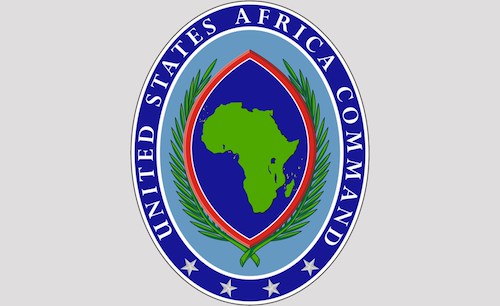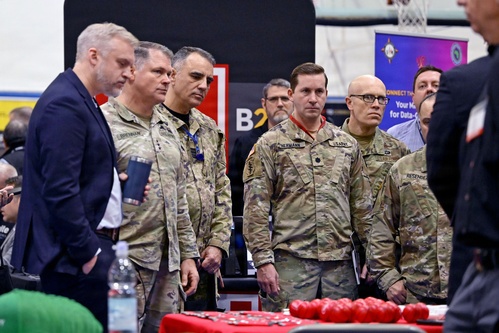January 19, 2009, Martin Luther King Day, is a U.S. federal holiday to celebrate the accomplishments of Dr. Martin Luther King Jr., the U. S. civil rights leader who inspired Americans of all ethnicities to protest against racial discrimination in the 1950s and '60s. In turn, the U.S. civil rights movement was closely related to the independence movements of the nations of Africa. The following articles, written by the U.S. Department of State, are posted on the U.S. Africa Command website to raise public awareness of the role of African Americans in the U.S. military throughout history.
Obama Inauguration Will Honor Black Civil War Volunteers: Storied Massachusetts infantry to march in Obama's inaugural parade
By Stephen Kaufman
America.Gov (U.S. Department of State) staff writer
"Will the slave fight?" asked abolitionist Wendell Phillips in 1863, at the height of the American Civil War. "If any man asks you, tell him 'no.' ... But if he asks you whether the Negro will fight, tell him 'YES!'"
At that time, the 54th Massachusetts Volunteer Infantry, made up of enlisted African-American soldiers and white officers, was just being formed. It would prove Phillips correct and inspire greater African-American participation in U.S. military forces.
Now, 146 years later, a company of Civil War re-enactors, including descendants of original unit members, will march in President Barack Obama's January 20 inaugural parade, which Benny White, a lieutenant in the 54th's Company A, describes as "the greatest honor that I've ever had."
White, 64, grew up in Boston. Despite his interest in the Civil War, he was not aware of the history-making 54th until the 1989 film Glory portrayed the unit and inspired him to join other New Englanders in forming Company A to participate in historical re-enactments.
The 600 members of the original 54th were not the first African Americans to fight in U.S. military battles, but they were the first unit to receive the same military training as whites. They won acclaim on behalf of all African-American soldiers for their valor and skill, especially after leading the July 18, 1863, assault on Fort Wagner near Charleston, South Carolina, in which nearly half were killed or injured.
The soldiers fought despite being offered less pay than their white counterparts and with the knowledge that the Confederate government had decreed that black soldiers and the white officers commanding them would be killed even after surrendering.
HISTORICAL RECOGNITION CAME SLOWLY
"When I was younger I went by the [54th Massachusetts] monument in downtown Boston on school trips and...they never really said that that's who they were," White told America.gov.
He said his research showed that after the war ended in 1865, the unit was not allowed to participate in the final victory review in Washington, and its veterans, most of whom lived in a slum area near the Massachusetts state house on Boston's Beacon Hill, initially were not recognized for their participation.
Construction began on the Boston monument in 1884, and four decades after fighting in the assault on Fort Wagner, Sergeant William Harvey Carney became the first African American to win the Medal of Honor.
In 1999, the African-American Civil War Memorial was completed in Washington to honor not only the 54th, but all of the 209,145 black soldiers who fought for the Union in the American Civil War.
Although the film Glory helped bring attention to the unit and the Civil War service of African Americans, White said he is skeptical about some elements of the film, such as the denial of uniforms and rifled muskets to the black soldiers and other incidents showing they were treated differently than their white counterparts.
In 1863, Massachusetts Governor John Andrew "was very strict about how he wanted them treated, and he wanted them treated exactly the same as the white soldiers," White said. "So they came into the [training] camp and the barracks like everybody else. They were given their uniforms and the weapons and they were drilled just the way the white soldiers were drilled."
However, they were paid less than white soldiers. White said the average monthly pay for a private was $13, with $3 taken away to pay for the uniform.
Massachusetts lawmakers "wanted to treat [the black soldiers] as if they were teamsters who would be driving and wouldn't actually see combat. So they took another [and] they were offered only $7 a month," he said.
For 18 months, until the matter was resolved by the U.S. Congress, the soldiers and many of their white officers refused to accept any pay, as depicted in the film.
White said that by the end of the war, three African Americans had been commissioned as officers in the unit.
NOT JUST ANOTHER PARADE
Recounting his visit to Fort Wagner, White said the area has changed quite a bit since 1863 because parts of the seaside battlefield and fort have washed away, but its significance remains.
"To me it's really awe-inspiring to stand on that same spot where the soldiers had fought," he said. "We spent a couple of hours just walking over the sand dunes where the originals actually participated in the battle."
Looking ahead to the January 20 inauguration of the first African-American president, White said he is trying to convince himself that it will be "just another parade" in an effort to maintain his composure while leading his unit.
"But of course, obviously to me, it's a lot more than that," he said. "I've marched since I was probably about 15 years old in different things, and this is the greatest honor that I've ever had."
End of U.S. Military Segregation Set Stage for Rights Movement: African Americans' record of military service linked to equality struggle
By David McKeeby
America.Gov (U.S. Department of State) staff writer
African Americans have served in the U.S. military since the days of George Washington, but it took until July 26, 1948, for the country to begin living up the democratic ideals that they fought to defend.
The year 2008 marks the 60th anniversary of President Harry S. Truman's Executive Order 9981, issued July 26, 1948, declaring that "there shall be equality of treatment and opportunity for all persons in the armed services without regard to race, color, religion or national origin."
As many as 5,000 African Americans, drawn largely from the population of free blacks living in the Northern states, but also from the slaveholding South, are estimated to have served beside whites in the Continental Army during the American Revolution.
When America fought a devastating Civil War from 1861 to 1865, more than 100,000 African Americans served in the Union forces.
Although the Civil War ended slavery in the United States, the nation failed to address deep-rooted prejudices based on race and class in America, allowing bigotry and segregation to continue tarnishing the American dream.
Nevertheless, prominent 19th-century African American leaders, including civil rights pioneers Frederick Douglass and W.E.B. DuBois, encouraged black men to serve in the U.S. military, believing that by proving their loyalty and courage, they eventually could improve their position in American society in the face of discriminatory segregation laws and the ever-present threat of violence facing African Americans, particularly in the South.
"Let the black man get upon his person the brass letters, U.S.," wrote Douglass. "Let him get an eagle on his button, and a musket on his shoulder and bullets in his pocket, there is no power on earth that can deny that he has earned his right to citizenship."
FROM BUFFALO SOLDIERS TO TUSKEGEE AIRMEN
Although often confined in separate, white-led, noncombat labor units, African-American soldiers volunteered time and again for combat and field medical duties. They served with distinction during the Civil War in the 54th Massachusetts Volunteer Infantry regiment, immortalized in the 1989 film Glory; in the black cavalry units known as the "Buffalo Soldiers," who fought in the Indian wars and the Spanish-American War; and in the 369th Infantry, the "Hell Fighters from Harlem," who were awarded the French Croix de Guerre (Cross of War) for their heroism during World War I.
As World War II approached, the United States found itself opposed to fascist regimes and their racist ideologies, yet it had to reckon with the hard reality that many of its own 12.6 million African-American citizens -- about 10 percent of the population at the time -- were denied basic civil rights and human opportunities.
The bitter irony that President Franklin D. Roosevelt's "Four Freedoms" (freedom of speech, freedom of worship, freedom from want and freedom from fear) set forth as U.S. war aims were largely unavailable to African Americans did not stop 2.5 million black men from registering for the military draft. More than 1 million eventually served in all branches of the armed forces during World War II. In addition, thousands of African-American women volunteered as combat nurses.
At the same time, the National Association for the Advancement of Colored People (NAACP), the Urban League and other organizations appealed to the White House and the military, winning the integration of officers' training and expanding opportunities for all-black units.
Among the best-known black units in World War II were the Tuskegee Airmen, a group of African-American military pilots, who distinguished themselves in Allied campaigns in North African and the Mediterranean, becoming the only fighter escort group never to lose an Allied bomber to enemy action during the war.
African-American truck drivers and mechanics were also the backbone of the "Red Ball Express," the massive effort to keep the Allies supplied as they moved across Europe to end the war.
"AND WHEN I SAY 'ALL AMERICANS'"
Toward the end of the war, in 1944-45, the military began experimenting with integrated units to meet personnel shortages during the Battle of the Bulge on the German-Belgium border and elsewhere. As a result, more than 80 percent of the white officers reported that African-American soldiers had performed "very well" in combat and 69 percent saw no reason why African-American infantrymen should not perform as well as white infantrymen if both had the same training and experience.
But back home, old attitudes persisted. When returning African-American veterans became victims of violence in South Carolina and Georgia, President Truman took bold action, submitting a package of wide-ranging civil rights reforms to Congress and using his constitutional authority as commander in chief of the U.S. military to order desegregation of the armed forces.
"It is my deep conviction that we have reached a turning point in the long history of our efforts to guarantee a freedom and equality to all our citizens," he told members of the NAACP in a 1947 speech. "And when I say all Americans -- I mean all Americans."
By the end of the Korean War in 1953, the U.S. military was almost completely desegregated, including desegregation of buses and schools on military bases.
Sixty years later, it is evident that Truman's order transformed not only the armed forces, but broader American society as well, by serving as a powerful blow against segregation and opening the way to the civil rights movement of the 1950s and 1960s.




